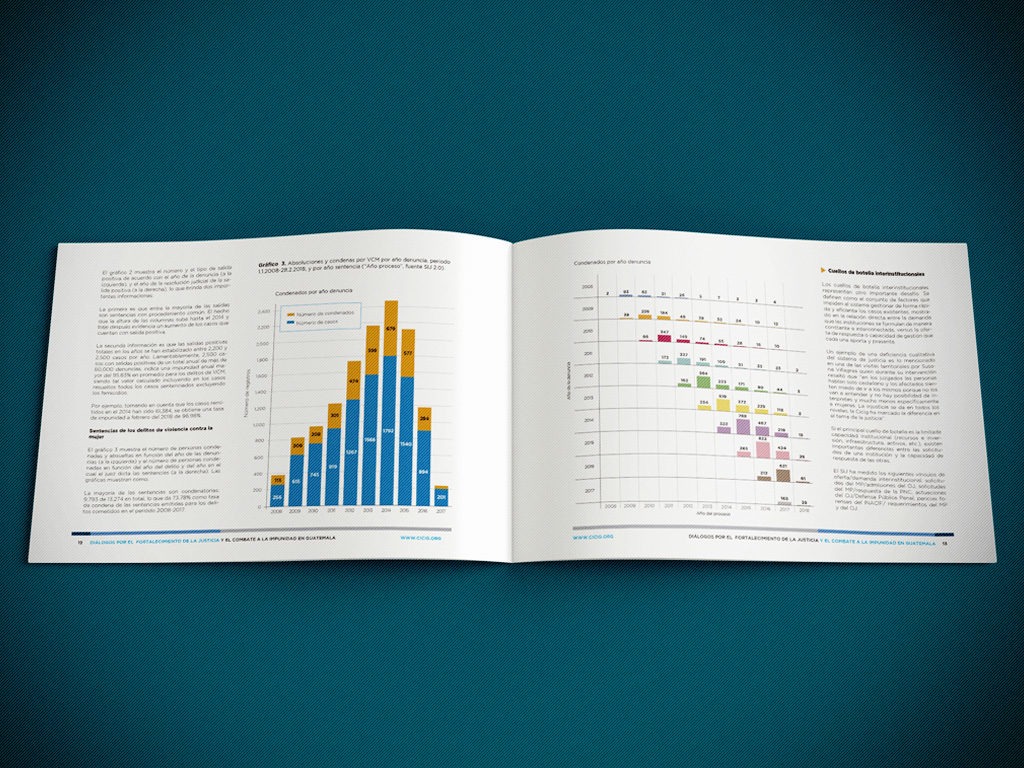STATEMENT 029 | Photo: CICIG.
The International Commission against Impunity in Guatemala, with the support of the German Cooperation GIZ – through the CICIG Strengthening Project, which is implemented on behalf of the German Federal Ministry for Economic Cooperation and Development (BMZ), presented to several sectors the report “Dialogues for the Strengthening of Justice and the Fight Impunity in Guatemala”.
In the second half of 2018, CICIG presented to the general public the concepts for the construction of a law-abiding culture and the reestablishment of the Rule of Law. In the fulfillment the powers established in the Agreement, CICIG started to work on the formulation of laws and public policies that would be appropriate to modernize the system. The Commission had the support of the German Cooperation, through its GIZ agency, and they worked in this project as strategic partners.
In this context, spaces for public discussion were established to address the issues with different representatives of the sectors of society. The goal focused on resuming the discussion on some of the most important innovations for democratic consolidation, taking as a starting point these spaces for dialogue, which would generate the necessary consensus to motivate the implementation of reforms.
The project was approached from a decentralized perspective to cover the most representative territories and sectors of the population. Diagnoses were prepared on the operation of the system of justice to guide the discussion towards the search for consensus and solutions. The Commission worked on the generation of a platform that would allow the development of such analysis. Thus, the Integrated System of Justice -SIJ- was created, a model that collects all information related to the operation of all justice institutions.
A series of national tours were organized to present the diagnoses. The departments that the system showed as more vulnerable in the fulfillment of justice were selected. The analysis of the information in the Integrated Justice System shows that the relationship among the institutions of the justice sector lacks efficient mechanisms for dialogue and programming, which turn into system scourges and weaknesses that affect access to justice for Guatemalans.
Likewise, the structure of each institution and its databases have information gaps, which allow a complaint, a crime, an offense, or a case to remain unpunished. According to the data collected, the poor budgetary allocation, as well as insufficient inter-agency planning, leads to high levels of impunity for the majority of crimes committed in the country. CICIG raised these challenges in the different spaces where SIJ was presented.
Likewise, within the framework of cooperation with the German agency, GIZ, a series of private meetings were held with public officials, academics, social leaders, as well as representatives of national and international organizations. The challenges to consolidate the reform process were addressed in these spaces with the help of experts in the area. The actors that met in these discussion spaces occupy positions that allow them to participate in the decision making around the different issues raised.
Both activities, both territorial visits, and private dialogues, were carried out in parallel. This dynamic allowed the simultaneous opening of debate spaces, but also of the proposal. The territorial presentations focused their efforts on attracting the attention of authorities and local leaders, to encourage discussion about the challenges of justice in different regions. At the same time, private discussions brought together experts from different sectors of society, who proposed consensual solutions to different problems.
To conclude the exercise, GIZ and CICIG, in a strategic alliance with the American Bar Association (ABA) organized an international forum to present the project under development. This activity had a different approach since from a broader perspective, the effort aimed to position in people’s mind the pending progress in the process to clear and strengthen state institutions. In fulfilling the objective, international experts were invited to participate in the event. They are people that have played an essential role in the transformation processes of other democracies in transition.
Conclusions
On the justice system:
Some of the problems highlighted in the report can be addressed through instructions to local officials from the highest institutional levels; others may be solved through inter-agency agreements or the activation of more robust controls and performance evaluations (without affecting the independence of the judiciary).
Although annual budgets are higher every time, inter-institutional bottlenecks, the workload, low institutional performance because of staff shortages, or low efficiency and the lack of prioritization do not allow for systemic improvements that increase of sentences, positive outcomes for victims or other outlets.
Law-Abiding Culture:
Within the framework of promoting a law-abiding culture and the fight against corruption and impunity, the law-abiding culture plays a decisive role in attaining the society that all we want. The tireless work of different sectors of society in search of a law-abiding culture have focused their effort towards the need for the legality, human rights and the certainty of punishment and sanctions, which are a priority for the State.
The medium- and long-term sustainability involves educational, socialization and training measures that turn respect and a law-abiding culture into an essential aspect of life at every level (family, social, political, among other levels). Cultural change involves getting new generations to think and act according to ethical values and lifestyles and that they will accept the differences that make Guatemala a multi-ethnic, multicultural, and multilingual country.
REPORT:
Download pdf report (spanish version)
PHOTO GALLERY:
PRESENTATIONS:
Presentación_Informe_JusticiaGtPresentacion_GIZ_SIJ_2019
VIDEO:

